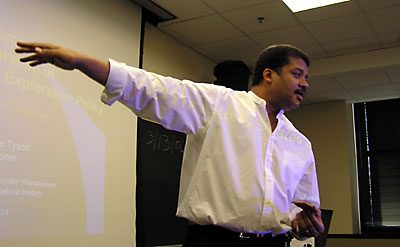A look inside the Aldridge Commission<< page 1: sustainability and bipartisanship Hubble and the initiativeTyson, an astrophysicist, was asked for his opinions on the future of the Hubble Space Telescope, particularly the controversy that has erupted since NASA cancelled the final shuttle servicing mission to the telescope. Hubble, he said, was the result of a “Faustian bargain” the astrophysics community made with NASA by linking science with the agency’s manned spaceflight program. That bargain was a dangerous one because manned spaceflight has not been driven by science. “The act of putting people into space to do science has been more a political decision than a scientific one,” he said. As a result, when NASA got its new vision that called for phasing out the shuttle, Hubble became “collateral damage.”
The problem for NASA, though, is that Hubble has become a “household telescope” over the years thanks in large part to NASA’s publicity surrounding its scientific achievements. “Hubble is in people’s living rooms every couple of weeks,” he said. Noting that Sean O’Keefe called NASA a “beloved agency” when the new initiative was unveiled in January, Tyson said, “I don’t think he thought deeply about why that’s so.” Hubble, Tyson argued, has provided “buoyant sustenance” for the agency in the arena of public opinion. “To say we’re not going to fix it, I think, is treating your support more lightly than it deserves to be treated,” he warned. “I worry about the fallout from that effect because the public is fickle.” Comparing commissionsThe Aldridge Commission is not the first government commission Tyson has been a part of recently. Two years ago he served on the Commission on the Future of the U.S. Aerospace Industry, a commission established under a provision of a defense authorization bill to examine the state of the overall aerospace industry, including space as well as aviation. (The chairman of that commission, former congressman Robert Walker, is also a member of the Aldridge Commission.) The Aerospace Commission issued its final report in November 2002, including one chapter specifically on space issues that Tyson helped create. Tyson noted that there are some major differences between how the two commissions operate. The Aerospace Commission was, in his words, “testosterone-driven”, shaped to meet the specific needs of an industry and populated with representatives from that industry’s various constituencies, from industry executives to unions to financiers. The Aldridge Commission, on the other hand, is focused not on an industry but on exploration. While Tyson was the only scientist on the Aerospace Commission, he is one of four scientists here, making up nearly half of the commission. That different composition, he said, makes for a different atmosphere in the commission’s meetings. There’s no formality to their meetings, particularly the closed meetings, he said: they just get together and talk about the issues. Although the backgrounds and the expertise of the various committee members might suggest they will each specialize in one of the general themes of the commission, Tyson said that they have not formally broken down into subcommittees.
Time is also of the essence for the Aldridge Commission. Although the Aerospace Commission had a full year to work on their report, this commission is required to submit their report by early June, 120 days after their first meeting. Tyson noted that the commission is actually designed to exist for 180 days: the final two months is mainly a formality, allowing the members to discuss the report “under the umbrella of the commission.” As of early March the commission’s web site, www.moontomars.org, had received 2.2 million hits. Tyson said there have been over 4,400 comments submitted from over 50 countries, with the largest input from people aged 30-39 followed by those aged 20-29. Within the US, the most common home states of those submitting comments have been California, Texas, and Florida. That public input and interest will be critical to the long-term success of the initiative. “It’s going to be our job to convince the public” of the benefits of the initiative, he said. “If and when we do that, then the whole nation takes ownership of the space program on a level that prevents any presidential candidate from threatening it. Certain topics cross the aisle in Congress, and we have to enable space to be one of those.” Home |
|
